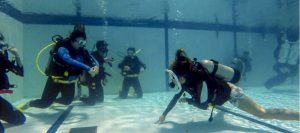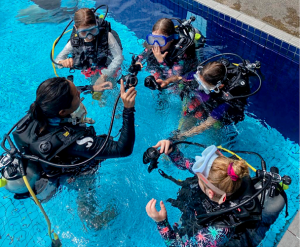Besides experiencing a whole new world underwater, scuba diving offers a great deal of health benefits

BY MELANIE HWA
With the increase in disposable income over the years, more and more people are seeking activities that create memories that not only last a lifetime, but at the same time drives a healthy agenda too.
This is why scuba diving has increased in popularity over the years. Want to know how diving into a whole new world beneath the surface opens up a great deal of health benefits for you? Read on!
At first glance, is scuba diving an extreme sport and isn’t suited for many? That’s a common misconception.
In reality, you don’t need to be an athlete to dive. However a basic level of fitness is required to ensure that you are comfortable while diving. The best thing is, the more you do it, the more health benefits you’ll reap.
Health benefits of scuba diving
• Promotes physical fitness
The Professional Association of Diving Instructors (PADI) estimates that a leisurely boat dive in warm, tropical waters burns approximately 300 calories an hour, equivalent to hiking or a brisk walk.
You will find that scuba diving is an effective way of gaining fitness and losing weight. Requiring you to swim throughout the duration of the dive (usually 45 minutes) leads to increased breathing and heart rate during this full body workout. Long term diving will keep muscles toned and increase your strength and endurance.
Staying underwater for a prolonged period also promotes the burning of calories as the body works harder to keep it warm. The human body’s core internal temperature is approximately 37°C.
 When the internal temperature rises or in the case of in-water activities, falls, the body tries to adjust by using internal mechanisms to return the core temperature to homeostasis. The effect is analogous to heating a cold house in winter — you can do it by lighting a fire or turning up the thermostat on the central heating, but this burns more fuel.
When the internal temperature rises or in the case of in-water activities, falls, the body tries to adjust by using internal mechanisms to return the core temperature to homeostasis. The effect is analogous to heating a cold house in winter — you can do it by lighting a fire or turning up the thermostat on the central heating, but this burns more fuel.
Another common misconception is that the weight of the tank would hinder individuals with physical limitations who want to dive. The weight of the tank is close to nil when in water due to the buoyancy force from water.
Adaptive methods can be applied to suit the needs of different students and divers. When in water, scuba diving is low impact by nature – making it perfect for individuals with joint and ligament issues.
• Lowers blood pressure
Scuba diving is generally a very relaxing and calming activity. The lower temperature of water physically calms the body and blood vessels, which in turn lowers the heart rate and blood pressure. Prolonged calmness will reduce stress and help in promoting mental and emotional wellness.
• Improves mental health
A student once told me, “When I learn to dive, I relearn how to breathe. This is something that I’ve never paid any attention to”.
The most important rule of scuba diving is to never hold your breath. And because of that, one of the first things you learn when taking your scuba diving course is to relearn how to breathe mindfully.
Being mindful of your breathing is the most basic form of meditation. The simple act of conscious breathing creates more awareness of your body and mind. Over time, this practice will help control anxiety, reduce age-related memory loss, fight addiction, calm the mind as well as promote emotional health and self-awareness.
Practicing deep breathing will help strengthen the core, increasing stamina, boosting the immune system and increase mindfulness.
• Healing effects of salt water and sunlight
Due to today’s increasingly sedentary lifestyle, people spend significantly more time indoors. The lack of going outdoors causes a deficiency of Vitamin D which is important to regulate the amount of calcium and phosphate in the body.
These nutrients are needed to keep bones, teeth and muscles healthy. A lack of Vitamin D can lead to bone deformities.
Scuba diving encourages you to soak in the goodness of the sun and sea. Being exposed to the sun encourages your skin to produce Vitamin D from cholesterol. When the sun’s Ultraviolet B (UVB) rays hit cholesterol in skin cells, it provides the energy for Vitamin D synthesis to occur naturally.
• Connection with nature

Growing up in a concrete jungle has created a disconnect for humans from the natural environment. The disconnection from nature can have a negative impact on humans, causing us to feel less curious, less caring, and eventually less responsible to protect this environment.
Scuba diving exposes us to the beauty of nature which in turn increases our appreciation and respect for nature. Seeing with our own eyes what the amazing creatures are able to do, creates a connection and appreciation for these creatures.
Scuba diving also brings us to paradisiacal places which people often do not visit. The inborn need and curiosity for humans to explore drives a sense of wholesomeness and appreciation for the life we have on Earth.
• Life-long friendships
 Sharing a common passion for something is the best way to start a long-lasting friendship regardless of the differences in culture and background. And if one is lucky enough to share a lifelong memory or experience, this becomes a sacred bond that binds a friendship.
Sharing a common passion for something is the best way to start a long-lasting friendship regardless of the differences in culture and background. And if one is lucky enough to share a lifelong memory or experience, this becomes a sacred bond that binds a friendship.
Do not worry about starting your scuba diving journey alone. You will meet friends along the way, some of whom will become your friend for a lifetime.
Is it safe to scuba dive during the pandemic?
The World Health Organisation (WHO) has said Covid-19 does not transmit through bodies of water such as pools, ponds or oceans. In fact, the WHO has released multiple statements stating that Covid-19 does not transmit through water.
However, WHO cautions to practice physical distancing whenever above water to avoid infection. This is why we should practice strict compliance with a comprehensive SOP at reliable dive centers to ensure the safety of everyone.
Outdoor pools are preferred to ensure good ventilation, reducing the likelihood of the virus spreading and lingering in the air. It is also best for the PH levels of the chlorinated pool to be checked every hour to ensure it is safe for divers.
 All divers must rinse before and after entering the pool to ensure they are clean. There must also be good physical distancing between each student and instructor whenever above water. Scuba diving gears must be disinfected and sanitised after every use to ensure they are safe for the next person.
All divers must rinse before and after entering the pool to ensure they are clean. There must also be good physical distancing between each student and instructor whenever above water. Scuba diving gears must be disinfected and sanitised after every use to ensure they are safe for the next person.
So, what are you waiting for? With international borders mostly closed due to Covid-19, now is the best time for you to take up your PADI Scuba diving licence and explore the beauty beneath the sea levels of our very own Malaysian waters! — The Health
Melanie Hwa is the Founder and Instructor at Flow Dive Center in Petaling Jaya. She strives to spread the word about the beauty and benefits of scuba diving to everyone!








